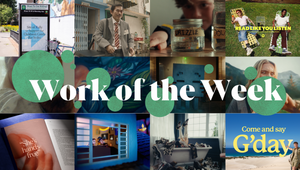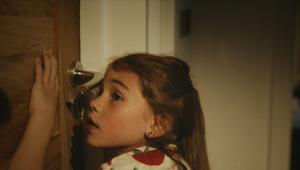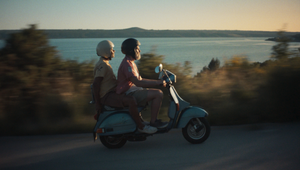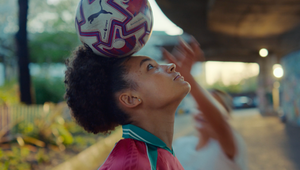
Finely Sliced: How Editing Taught Andrew Cross Self Acceptance

Andrew Cross is an award-winning documentary and short form editor represented by The Assembly Rooms, one of London’s leading edit houses. This year has seen Andrew launch into the short form edit world with a bang, he’s been awarded a Silver Lion at Cannes and an AICP award for his work co-editing “This is our BBC” (alongside contemporary Assembly Rooms editor Jack Williams). Andrew has collaborated with many esteemed film directors including the likes of Kevin Macdonald, Will Lovelace, Dylan Southern, Stuart Douglas and Andrew Douglas. His latest archive-led feature documentary, Meet Me In The Bathroom, which tells the story of the last bastions of Rock’n’Roll set against the backdrop of 9/11 in New York City, premiered at Sundance Festival 2022. He has also recently completed a feature-length documentary on football icon Ronaldinho (Ronaldinho: The Happiest Man In The World), charting the footballer’s legendary career. Cross has also cut films for The New York Times, National Geographic, Channel 4 and VICELAND and has been shortlisted for a wide array of awards for his editing including the Academy Awards, BAFTAS, Grierson Awards, Aspen Film Festival and most recently for his documentary The Nightcrawlers, which won ‘Best Short Documentary’ at the Emmy Awards 2020.
LBB> What attracted you to The Assembly Rooms?
Andrew> Since a young age I’ve always struggled to engage with anything that had any whiff of being didactic… be that in primary school lessons, the books I read or in the films I saw …my brain would just turn off. Nothing went in. I think these experiences gave birth to a need in me for film to be experiential - creating audience immersion at all costs. When a film does that it shuts off the world for 90 minutes. Everything else just disappears. My mind is silent. I’m alone with the film.
When I met with Sam Rice-Edwards, one of the partners at Assembly Rooms, we immediately connected on this core creative need and had an immediate capacity to communicate in shorthand about it…that’s a pretty special and rare thing (we have since been able to utilise this bond to collaborate as co-editors, as consultant and editor and also as director and editor on Sam’s directorial debut)… so I was immediately struck, on a gut level, with a want to be a part of the company.
Speaking to and then working alongside Nik, Eve and Sam at The Assembly Rooms it became clear that they prioritise the creative ambition of the project over anything else… no matter what scale, genre or form it takes and I think that’s what sets them apart and makes them a truly unique entity. To have feature documentaries, drama series, commercials and music videos all being cut under one roof creates a rich pool of influences and experiences for us all to draw from.
There is a genuine feeling at the Assembly Rooms that we all want each other to win and a lovely sense of ego-less-ness in how we all pitch in to help each other and collaborate. It means that the community and support system of the building spills out of the purely creative and into the social and emotional - a by-product of which is a platform where editors can produce their best work.
LBB> Who or what initially inspired you to get into editing? Why was editing your medium of choice?
Andrew> I’ve always had a pretty noisy head that’s narrated by a self-deprecating inner dialogue. Editing, simultaneously with prompting existential crisis and crushing waves of imposter syndrome (if you’re not having an existential crisis ARE YOU EVEN EDITING?), has been responsible for learning how to co-opt that inner voice and move towards self acceptance.
A well edited film is the product of hundreds of thousands of micro decisions. With each one you have the chance to go in the direction of fear or faith. It will always be a constant battle between both but the more I’m able to pull the vote towards faith the greater the chance of an emotionally resonating edit there is.
Faith by its nature involves a certain slathering of existential crisis; a willingness to scrap something you love and start again, to move forward on a purely emotional instinct, to follow someone else's vision fully even if you cannot yet see it yourself…but those crises become 0.01 percent easier each time and they come with great rewards. Following the good voice has taught me how to produce a few decent edits and producing a few decent edits has taught me how to follow the good voice. In short EDITING IS LYF.
LBB> How would you describe your editing style/approach?
Andrew> No matter what format I’m always seeking to create as much immersion as possible and put the audience front and centre of the story. At its core that means having the audience ask their own questions before you answer them - holding back information, whether visual, dialogue or action until the viewers are ravenous for it. It means making sure the audience's understanding of the plot does not succeed the protagonist’s and vice versa. It means using ellipsis of information to allow audiences to be satisfied by filling the blanks for themselves. It means DEATH TO PUNDITRY. It means doing as much as you can with as little as possible.
If all of those things are achieved then someone's capacity to hold in a wee after a large Tango Ice Blast at the cinema is quadrupled… and then my friend… your job is done.
LBB> Who are some of your biggest creative influences?
Andrew> I remember watching Shane Carruth’s Upstream Color when it came out quite early on in my career and it having a really big effect on me. It’s a bit of controversial choice for an editor because it was edited by the director (who is also the main character, sound designer and composer…eek) The cuts at points are overt and brutal but through the elegance and rhythm of the edit you are at no point alerted to their presence in a way that takes you out of the story. The pacing and balletic nature of the cuts turns what is a very abstract conceptual film into an immersive thriller that moves forward on and relies on an emotional engagement as opposed to a blow by blow understanding of the plot.
Gianfranco Rossi has always inspired me in the way he tells stories through the ellipsis of information far more than what is actually being shown on the screen. Focusing on a microcosm and being fully immersed in a particular world ends up actually commenting on the macro. This is an ethos I always try and carry with me into my work.
Frederick Paxton is a long time collaborator of mine and an incredible director and artist. The incredible composition of Freddie’s shots allow you to hold them for much longer than you may normally and in turn asks and allows the audience to reframe what they see beyond their auto-semiotic responses. You can tell with one single image what might usually take five, six ,seven images or even a whole film.
No interview with an editor would be complete without mentioning Walter F*****ing Murch. Urgh. How cliche. FFS! But experiencing the way he sound designed in THX1138 blew my tiny brain out. Then seeing how he applied that knowledge and incorporated it into his proceeding edits made me really appreciate how incredibly vital sound is to a good edit. For that reason I always want to have a palette of sound design at an early stage of the edit and I always try my best to be open and useful to the sound mix once we get there.
LBB> What have been some of your favourite projects/campaigns you’ve worked on and directors and agencies you’ve worked with?
Andrew> I’ve been lucky enough to work with some truly incredible people such as Kevin Macdonald, ThirtyTwo, Orlando Von Einseidel, Joanna Natasegara and many more…and each of them have left me with a broader more open minded approach to filmmaking.
Working on Sam Rice Edwards ‘This Is Our BBC’ was particularly interesting. Because it took archive documentary techniques and applied them to short form sensibilities. The script was comprised entirely of phrases found within the archives of the BBC and on a daily basis we’d be inundated by clips from research, go through them in the edit, see what was working and what was not, come up with new ideas and then send these ideas back to research. We went through this process again and again for months until the film started to come to life.
There were many times where there was just one missing piece that couldn’t be found and we’d have to rethink a whole swathe of the film and send the research team off in a different direction. For each sentence that made the final script there were hundreds that did not and in total we looked at more than quarter of a million clips. It was a gruelling but ultimately very rewarding process.
LBB> What are your proudest career achievements overall?
Andrew> It’s always nice to receive recognition and obviously really good for proving to my parents that I have a real job…but I try not to give that too much headspace. There’s so many incredible things being made that will never have their moment at an awards ceremony. The most important thing is to be engaged in enjoying the process because you really have no control over the reaction. The better the life you are cultivating the better your edits will be anyway…
My fondest experience has been editing Harmony with Frederick Paxton (director) and Maria Babikova (producer) over a long hot summer in London. The film was completely independent so we had no one else to answer to apart from ourselves. It was a really nurturing environment and if we hit a creative wall we found our way through it together…that might be scrawling mind maps all over the floor or going and jumping in Hampstead Heath ponds. When we hit export for the last time all three of us believed in every single frame of that film.
LBB> What type of projects/campaigns/genres would you like to work in that you haven’t already, and why?
Andrew> I am truly open to working in any genre or form if the creative scope of the project is right.
LBB> What have you learned from your experience in long form/ doc that you can apply to short form at TAR?
Andrew> I think the willingness to analyse every little off-cut for narrative potential. Oftentimes in documentary you are having to create the threads of narrative from fragments of material.
I think having that awareness and open mindedness is really important even when approaching something scripted. It could be a character's micro-movement, a telling look, the atmosphere of a certain shot …but all these incidental things can be threaded together to build subtext and narrative.















